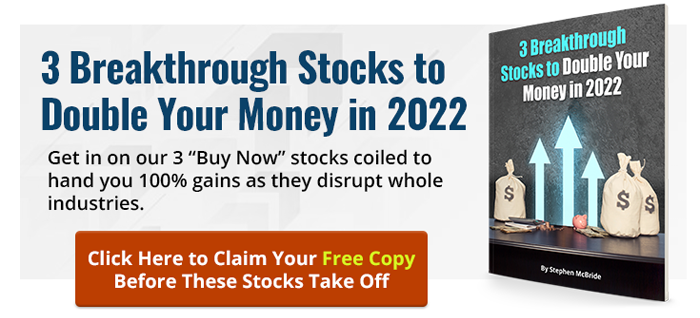Chris Reilly: Stephen, you reached out and said you wanted to do an interview ASAP for RiskHedge readers.
What’s on your mind?
Stephen McBride: Well, there’s a lot going on in the world right now. Fears about the Delta variant. Inflation’s making a comeback. There’s chaos in Afghanistan.
Meanwhile, the Nasdaq and S&P 500 just struck record highs.
Investors are confused. And I don’t blame them. Negativity is dominating the news. And you’ve got so-called “experts” on TV claiming this stock market bubble is about to pop.
Point is, Chris, I called this interview today for one simple reason.
I want our readers to focus on the BIG PICTURE.
Chris: And what’s that?
Stephen: Hands down, today is the most exciting time to be an investor since the mid-1990s, when the dot-com boom was just starting.
That’s because, for the first time in 25 years, ordinary investors can get in on the ground floor of some of today’s most exciting firms.
This has kickstarted a new golden age of investing.
Chris: That flies in the face of what you hear everywhere else. Can you explain?
Stephen: It has to do with the sudden reversal of a 25-year trend. Let me ask you, how many US stocks do you think the average Joe could buy in the late 1990s? Give or take…
Chris: 5,000?
Stephen: 8,900 companies were listed on the stock market back then.
Today? That number has been cut in half. There are only about 3,600 public companies in America today.
The number of stocks has been declining for years. At a certain point, stocks became rarer than Siberian tigers!
There are several reasons for this drop-off. It’s mostly due to fast-growing startups choosing to stay private for longer. This was terrible for ordinary investors. They missed out on all the juicy gains you can earn from getting in early on a world-changing company.
Take Airbnb (ABNB), for example. Great stock. One of the most disruptive firms of our generation.
But by the time Airbnb IPO’ed, it was a colossal company. Bigger than FedEx, bigger than Cigna. All the early-stage upside had been siphoned away by venture capitalists and Wall Street.
Chris: The average guy never had a chance.
Stephen: Exactly. Same thing with Uber. Former cyclist Lance Armstrong was an early investor in Uber. He invested $100,000 in 2009 when the company was valued at less than $4 million.
By the time ordinary investors got the chance to buy Uber at its IPO in 2019, Armstrong’s initial stake was worth 25,000X.
Chris: That’s great for Lance… but awful for regular investors who never had access to this opportunity.
Stephen: But the exciting thing is, in the last year or so, public markets have staged a turnaround. For the first time in 25 years, the number of US stocks is growing.
Last year over 450 companies listed on the market in 2020—more than twice as many as 2019.
That’s important because many of these new stocks are young, disruptive companies—like Airbnb and Uber in their early days.
That’s the heart of why we just entered the Golden Age of Investing. In short, this is the first time since 1990’s tech boom when the average investor can buy many of the best, fastest-growing companies in the world.
Chris: What changed?
Stephen: SPACs, or special purpose acquisition companies, have a lot to do with this. In short, SPACs make it far easier for smaller, fast-growing companies to list on the stock market without doing a regular IPO.
Space pioneer Virgin Galactic (SPCE) was an early SPAC that we own in the Disruption Investor portfolio. I think SPCE triggered the SPAC mania we saw last year. It was a moment where millions of entrepreneurs across America, as well as big and small businesses, realized this was a new way to go public.
But it’s not just SPACs. Regular IPOs have surged, too. The IPO market had barely been treading water for the past few years. But in 2020, the number of IPOs surpassed a high set in 1999.
In short, I believe it all came down to a realization that companies can, and often should, go public at an earlier stage in their life cycle.
Chris: What should investors who want to take advantage of this opportunity do?
Stephen: Again, Virgin Galactic was one of the companies to set this whole trend off. There’s been over $400 billion spent in the space economy. Right now, SPCE is the only “pure play” space travel company. But that’s just the beginning.
Virgin is the only company in the world that’s figured out how to build an “airplane” that can fly passengers at 2,500 miles/hour. That’s roughly 4X the speed of a normal jet.
It’s using this technology to fly folks to space. But this feat of engineering has laid the foundations for hypersonic travel on earth. And it will transform our whole idea of travel.
Chris: What other new opportunities are you following?
Stephen: We’re invested in proteomics, which is essentially “Genomics 2.0,” or an entire new branch of molecular biology. Proteomics will allow us to do things like detect Alzheimer’s in a person 20 years before it becomes an issue.
When we started looking at proteomics a year ago, there was one publicly traded stock in the space, and now there’s four or five. I recently talked to three CEOs of proteomics companies and they all said they went public to raise money and “push this huge trend forward.”
But recently, I’ve discovered that some of the best disruptive businesses aren’t listed on the stock market. And it’s not because they’re still private…
Chris: Go on…
Stephen: Years ago, the internet revolutionized the way business was done. Amazon (AMZN) became the world’s largest bookstore without having any physical book stores. Just like Airbnb became the world’s largest hotel chain without owning any actual hotels.
There’s a similar transformation, only bigger, happening now. It has to do with cryptos, and the exciting “blockchain” technology behind them.
I could spend the next 20 minutes explaining blockchain. But in a nutshell, it’s a whole new way of doing business. Right now, multi-billion-dollar businesses are being built on the blockchain.
And here’s the key: A whole new batch of “all-time great” businesses are being born on the blockchain as we speak. The next Amazon, the next Netflix… they’re just as likely to trade on the blockchain as on the stock market. Maybe even more likely.
Which means you can’t just invest in the stock market if you want to take advantage of this boom. You have to buy cryptos.
Every investor, without exception, should have a part of their wealth in cryptos today.
Chris Reilly
Executive Editor, RiskHedge
PS: Chris again... On Thursday, I'll share part two of my conversation with Stephen. You don't want to miss it. Also on Thursday, Stephen will be recommending his first-ever crypto play for Disruption Investor subscribers (not bitcoin). Paid-up members will get the full writeup in the upcoming issue. If you're not a subscriber to Disruption Investor, and would like to sign up, go here to learn more. By clicking this link, you'll also learn about one of Stephen's other big investing ideas—the "Millennial Melt Up."




